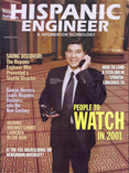 |
Hector V. Barreto is the 21st administrator of the U.S. Small Business Administration, a post that oversees a broad range of business development programs for America's small business entrepreneurs. With a portfolio of direct and guaranteed business loans and disaster loans worth more than $45 billion, SBA is the nation's largest single financial backer of small business. Barreto has a long history in the corporate sector and the small business community. As a young man, he helped his father manage a family restaurant, an export/import business, and a construction company. After graduating from Rockhurst University in Kansas City, Mo., he worked for the Miller Brewing Company as the South Texas area manager.
In 1986, he moved to California and founded Barreto Insurance and Financial Services. He later launched an additional business as a securities broker and dealer, specializing in retirement plans. Barreto is past chairman of the board for the Latin Business Association in Los Angeles. During his term, he increased membership by 50 percent, doubled revenues, and increased procurement opportunities for the membership. He also founded a small business incubator, which provides technical assistance, education, and development opportunities to small businesses. Barreto also has served as vice chairman of the board for the U.S. Hispanic Chamber of Commerce.
Hispanic Engineer & Information Technology recently spoke with Barreto about his vision as SBA director and how changes in information technology are affecting small and minority-owned businesses.
Interview with Hector Barreto
SBA Director
HE: In the past, you have called the "Digital Divide" an economic issue. Why is that the case?
Barreto: If people cannot afford to buy technology, then it is difficult to access it. That was an issue especially some years ago, when I started off my business in California in the late-1980s. And I know that even then, many small businesses really couldn't afford to buy the latest technology. Obviously, one of the encouraging signs that we are seeing is that technology prices have gone significantly down. Now you can buy a computer for $400. You can get online for 25 bucks a month. In some cases, you can get online for nothing. So things have gotten better in that way. That Digital Divide has narrowed.
HE: How much is the divide really an educational issue?
Barreto: That is a very big issue. I think you can say that across the board about a lot of different business issues. Small businesses don't know what they don't know. That has simply to do with the fact that people are so busy building their businesses that it is very difficult for them to look out and explore some of the opportunities and resources they can access at little or no cost. And obviously that is something we are very interested in doing at the SBA level.
HE: Is there any difference among racial and ethnic groups in how they use information technology?
Barreto: Again, I think the two major factors are not having the resources to purchase the equipment and the other thing is also not having a historical perspective of it. In other words, it is not like many minorities had family members or family businesses that used technologies or used computers. Oftentimes, this might be a first generation that's going to be accessing computers and the Internet for the very first time. And so what we're starting to see more and more is that more of them are getting with it. It is interesting why that is happening. Sometimes, I think, it is because of the associations that they have, the networks they are part of that gives them ideas. Sometimes, we have seen where the kids who are learning about computers in school are coming home and saying, "I have to have a computer for homework," and parents want to get it for them. In some cases, the children are teaching their parents how to also use this equipment for business.
HE: Is there a divide there in terms of the knowledge some racial and ethnic groups have about this?
Barreto: I haven't seen a big disparity among communities. The problem is not just getting access to technology. It is also fully implementing and utilizing technology. It is great if a small business is using the computer. But if they are not using that computer to go online, then they are not getting the full use of the tool. It is great if someone has a computer and is using it. But if they are not taking advantage of e-commerce opportunities, then it loses its advantage. There is an evolution that takes place. What we have to do at SBA -- and we are doing it -- is to help people go up those levels of that evolutionary scale so that they are fully maximizing the use of those tools.
HE: Do you have training programs to that end?
Barreto: Well, we have a lot of different resources. Among the things that we have are something called Business Information Centers. We call them BICs. BICs are centers that are located in communities across the United States that have the latest technology. So what we do is we'll bring small businesses in and teach them how to use computers. Teach them how to utilize the most current, state-of-the-art software that is out there. Teach them how to apply this to the kind of business that they're in. We do a lot of that. But we have a lot of resources. We have a thousand small business development centers in the United States. They're in every state, in every city. These are partnerships that we oftentimes do with universities or other nonprofits. A lot of technology training is occurring in these business information centers. We also have 12,000 volunteers who give their time to help small businesses. This is called the SCORE (Service Corps of Retired Executives) chapters. One of the first things these executives do is they sit down and talk to these small business people and talk about what they are doing with technology and try to get an assessment of what their knowledge base is. And they have been a great resource for helping small business. A lot of times people don't know this, but the place where SBA really helps the most small businesses is in education and technical assistance. Technology is becoming a bigger part of that. Last year, SBA helped to train 1.3 million small businesses in the United States. I'd venture to say that is one of the largest training programs in the country. Again, a lot of the issues that are being dealt with are technology-related.
HE: The SBA attracted $4.5 billion for small business last year through its venture capital program. How much of this went to technology companies?
Barreto: The lion's share went to technology firms. What we do is we provide leverage for venture capital funds. The firms have a responsibility to raise a certain amount of capital, and the SBA can leverage that maybe two to one. So if they raise $10 million, it goes from being a $10-million fund to $30-million. Now, each of those funds has a specific focus. I know a lot of money is going to technology companies. I think that is not unique to SBA. A lot of the capital being raised generally is going to technology firms.
HE: Even with the downturn?
Barreto: Things have slowed way down. Venture capital is harder to get now. People are being much more judicious with their investments. The old days where you can come up with a great idea and a great business plan and call your shot are over.
HE: One of your previous businesses was in financial services. What was your personal experience in trying to keep pace with technological changes?
Barreto: Those industries have always been on the front end of a lot of technology. Technology is so pervasive in the financial services industry and in the insurance industry. We use computers for everything these days, things as simple as getting the latest rates. There is illustration software that helps you create proposals for clients. Checking statuses of cases when they are in the underwriting cycle. A lot of marketing is occurring on the Internet. So computers and technology have always been a major, major force in the insurance industry. In fact, what I used to say when I headed chambers of commerce and business associations, I used to say to our members that having technology and a good program to utilize it was not going to be an option any more. It wasn't a question of "if" any more, it was a question of "when." If you had any interest in doing business with Corporate America or the government, you really had to communicate with them through technology. Now, that has been reaffirmed from what I can see here at SBA.
Michael Fletcher can be reached at MFletcher@ccgmag.com.

